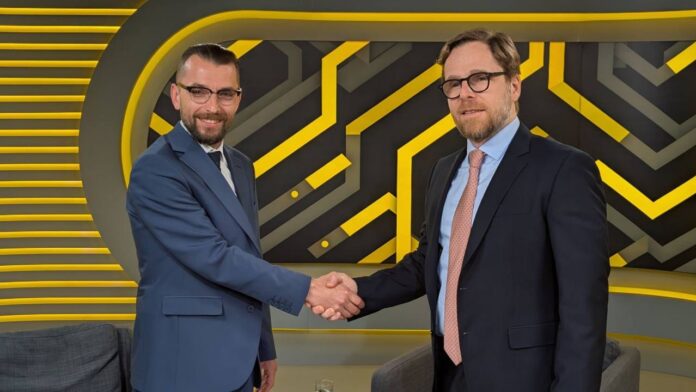Moldova could join the European Union in 2029, 2034, or never—if it doesn’t work hard enough, warned Lithuanian Ambassador to Chisinau Tadas Valionis in an exclusive interview with RLIVE TV. He discussed Moldova’s progress and shared Lithuania’s experience with European integration.
During the interview, journalist Traian Stoianov asked whether Moldova could meet the 2030 EU accession target set by Chisinau officials.
“We started negotiations in 2000 and concluded them in 2002, so it took us two years to negotiate EU membership. Then we waited a few years for ratifications and officially joined in 2004,” said Valionis. “Technically, it is possible. It all depends on the will of the people and the government. There is sufficient political will in the EU to pursue enlargement.
Moldova now has a historic opportunity to give its best. But keep in mind, ratifications and accession are ultimately political processes. Many things can happen. Accession might take place in 2029, 2031, or 2034. But if you don’t work, it may never happen.”
Valionis emphasized the need for national consensus.
“Moldovan political parties, government leaders, and citizens must understand this. That’s exactly what worked in Lithuania,” he said.
“In Lithuania, political parties helped a lot. We had consensus on EU membership across the spectrum—liberals, social democrats, and conservatives. Regardless of who governed, everyone worked toward integration. We knew what we wanted,” he added.
FOR THE MOST IMPORTANT NEWS, FOLLOW US ON TWITTER!
The ambassador promised Lithuania’s continued support throughout Moldova’s accession process.
“Moldova now has the chance to look across the EU and choose the best practices. Lithuania has about 10 experts working permanently in Moldova on various projects,” Valionis said.
He highlighted agriculture and the environment as critical areas, noting these are usually the most challenging and last chapters in EU accession talks.
“We’re doing our best to anticipate challenges and share what works. We have experts in Moldova’s Ministry of Agriculture and environmental protection. These areas are crucial because they’re complex and require long-term reform,” Valionis explained.
“We also have specialists working with the Interior Ministry on police cooperation and anti-money laundering. Soon, we’ll launch a defense project to help reform the Military Academy and training programs,” he concluded.


